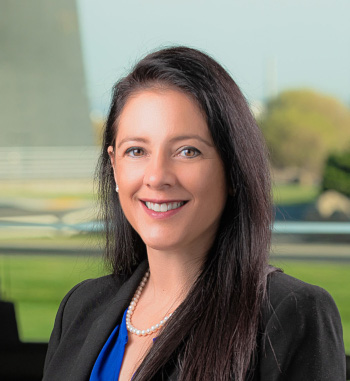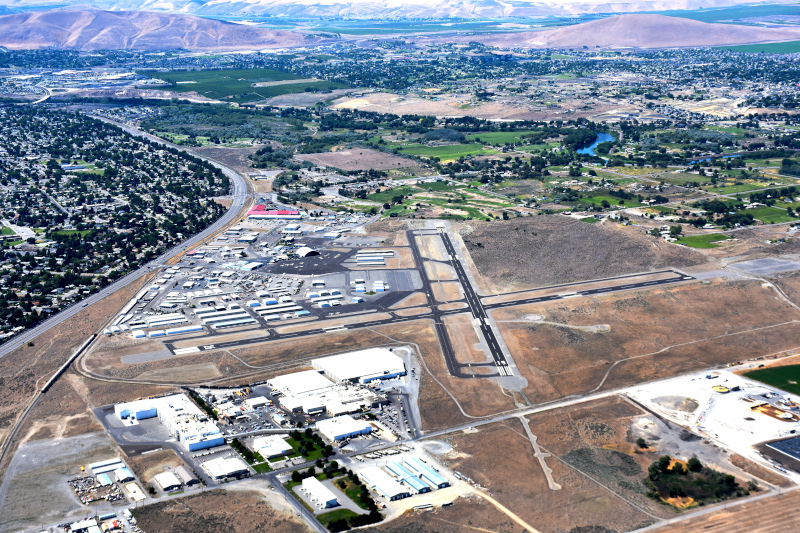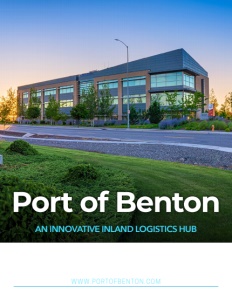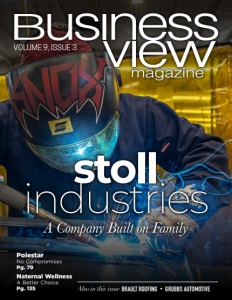Port of Benton
An innovative inland logistics hub
Business View Magazine interviews Diahann Howard, PPM®, Executive Director Port of Benton, Washington state, for our focus on U.S. Inland Ports
Port of Benton is a busy Washington state inland port in the city of Richland, in Benton County. In total, the port covers 2,756 acres with 12 sites, 50 buildings, and two airports and has assets above $90 million. As a significant regional commercial hub, the port provides tremendous economic benefits to businesses that choose to set up shop within its district.
These economic benefits are represented by substantial revenues generated by businesses in the port boundaries, currently slightly north of half a billion dollars annually, or 5% of the county’s economic output. In addition, port businesses maintain an annual payroll of $200 million, representing over 10,000 jobs within the port district.
With such an impressive track record, the Port of Benton has risen to become a critical economic center within the Tri-Cities, complementing the 75 port districts in Washington state, including the Port of Pasco that lies several miles southeast toward the confluence of the Columbia and Snake Rivers.

Diahann Howard, Executive Director
Port of Benton was established in November 1958, becoming the 46th port in Washington. Diahann Howard, PPM®, Executive Director for the Port of Benton, shares, “Our port is a special purpose government established under state statute with the primary goal of driving economic development and tourism. The port district covers two-thirds of Benton County, has a community of over 50,000 people living within its limits, and covers the cities of Richland, Benton City, and Prosser.”
The port’s primary economic lever is logistics. That includes a pair of airports, a short-line rail leased to a short-line operator along with access for Union Pacific Railroad and BNSF to run direct, and a barge facility at River Mile 343 on the Columbia River. “The port’s two airports are Richland Airport, a regional airport that focuses mainly on business and general aviation, and Prosser Airport, a community airport,” says Howard. “Both serve different aspects of the Tri-Cities economy.”
The Washington State Department of Transportation recently conducted an Aviation Economic Impact Study of Washington’s public-use airports to measure the annual economic impact that airports provide to local communities, geographic regions, and statewide.
The study uncovered the following total economic impact data about the Richland and Prosser Airports:
Richland Airport: 682 direct jobs, $44 million in labor income, $65.6 million in value addition, and $114.1 million in business revenues.
Prosser Airport: 238 direct jobs, $7.7 million in labor income, $12.3 million in value addition, and $22.2 million in business revenues.
Although the port’s airports are a significant economic driver, Howard points out that the purpose of the port is to cast a wide net to unlock the economic development potential of multiple industries. She recounts, “The Port of Benton was created to transfer federal assets, land, and facilities and use them for economic diversification for the community and the region. Our neighbors include Pacific Northwest National Laboratory and Washington State University, Tri-Cities, a land grant university.”
A soon-to-be tenant of the Port of Benton is X-energy, an advanced nuclear reactor and fuel design engineering company developing Generation IV high-temp gas-cooled advanced reactors and the TRISO-X fuel to power them. “The port and the wider Tri-Cities community has had a long history around clean energy, including nuclear energy,” Howard explains. “We’ve got a large community group led by industry, utilities, and the public sector, alongside university and education providers that have been working on a clean energy vision for the last 13 years. The region’s focus areas are electrification of transportation, hydrogen, energy storage, grid fuels, and advanced reactors.”

Richland Airport
As part of this vision, the port is keen to support companies working on projects to help Washington state and the nation meet decarbonization goals. It is doing this by embracing innovative and advanced industry solutions like the vertiport at Richland Airport that is currently under review by the Federal Aviation Administration. “With the vertiport, we want to position Richland Airport as a demonstration destination for tech companies working on next-generation transport solutions,” says Howard. “We also support companies that are aviation related seeking to set up shop inside or near the airport. We are working to establish a supply chain alliance to ensure our local companies are ready and certified to meet the needs of the clean energy sector within the port district and across the state.”
Through these initiatives, Port of Benton hopes to position Richland Airport as a gateway for corporate flyers who will join current tenants like Lamb Weston and Lineage Logistics, who maintain the largest commercial freezer in north America within the port.
While all these industries provide many exciting business opportunities, another side of the Port of Benton appeals more to the individual traveler: wine tourism. “The Tri-Cities is blessed with 300 plus days of sunshine each year,” states Summers Miya, Executive Administrator, Port of Benton. “The phenomenal weather makes it a great destination for travel, complemented by wonderful waterfront trails and a booming wine tourism industry.”
At the center of the wine industry are the Walter Clore Wine and Culinary Center and the Washington State University Wine Science Center. The latter is a teaching, research, and extension facility that is among the most technologically advanced wine research and education facilities of its kind in the world. It is mandated with transforming the Washington wine industry with cutting-edge science in the tradition of the state wine research pioneers Dr. Walter Clore and Dr. Charles Nagel.
“The ease of flying in and out of these locations for business or some wine tasting and purchasing makes this area such an incredible opportunity to experience the farm-to-table culture,” avers Howard. “It is much different than any other experience because we’ve got such a diverse array of wine offerings in our region provided by our terroir that yields a tremendous variety of grapes.”
Shifting the focus to the COVID-19 pandemic and its effects on supply chain networks, Howard points out that, as a port, they are part of the supply chain and at the center of trying to solve supply chain challenges for downstream industries. “Washington’s supply chain starts with the seaports, including Seattle and Tacoma, the Seaport Alliance, and the Port of Vancouver, USA. All these seaports are why the state has so many port districts because we’re part of the broader system moving goods from eastern Washington to western Washington and onwards.”
Two initiatives the port is undertaking to help reduce current supply chain bottlenecks include supporting trucker training to boost trucker numbers and collaborating with a local legislator Rep. Matt Boehnke, who is leading a supply chain caucus to discuss industry issues and viable solutions.
“Despite the difficult past two years, I am optimistic about the next three to five years because we have an incredible team of people who are strong in their own skill sets and collaboration,” says Howard. “The team did an incredible amount of work during COVID to prepare our port and our facilities to stand ready to serve our community and our taxpayers, and I hope that in the next three years, we can continue this trend.”
The port is also counting on the upcoming $2.5 billion X-energy project coming to north Richland. “We hope this project will lead to further advanced manufacturing projects as we provide facilities that help startup businesses and entrepreneurs,” Howard adds, “besides continuing to expand Washington’s offerings in value-added agriculture, from wine to all food products.”
The port plans to continue making significant investments in its airports, rail, and facility assets over the next two to three years to support these efforts. As Howard declares, “Our founding vision is to achieve recognition as a national hub for clean energy and innovation, and Port of Benton will do all it takes to support our community in achieving this vision.”
AT A GLANCE
Port of Benton
What: A busy inland port and regional commercial hub
Where: City of Richland, Benton County, Washington State
Website: www.portofbenton.com
PREFERRED VENDORS
KPFF Consulting Engineers – www.kpff.com
KPFF is a recognized leader in planning, design, and project management of a full range of railroad facilities from industry spurs to yards to stations to mainlines. KPFF’s integrated approach combines engineering excellence with effective operating strategies to deliver innovative solutions tailored to the unique objectives of each client.





